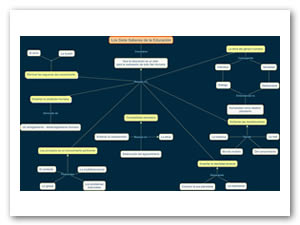Los siete saberes de la educación
Resumen
La educación marcada como uno de los pilares del desarrollo humano en la sociedad global del siglo XXI, es considerada una de las áreas con mayor amplitud en su régimen de aplicación, ya que está sujeta a la determinación de los factores y elementos con los que cada grupo social cuenta, principalmente por su situación geográfica, económica, política e ideológica entre otros, los cuales pueden hacer que dicho pilar tenga que ser adaptado a los recursos con los que se cuenta para su impartición, convirtiéndola entonces en una variable social, al no tener un mismo método y estrategia que permita obtener los mismos resultados lógicos, cognitivos y legales del individuo. Sin embargo al ser considerada una obligación para su otorgamiento por parte de los gobiernos hacia su pueblo, la UNESCO ha propuesto, que con base en la ideología justificada de Edgar Morín, se estandarice de forma general bajo los siete saberes de la educación, sin importar las condiciones, pero dando por hecho que el gobierno implementará los recursos básicos para su ejecución. Esta propuesta demuestra que el individuo en su desarrollo necesita un sistema de andamiaje para lograr la consolidación del modelo ideal de todo ser humano, el cual logrará ser útil y productivo a la sociedad en un estado libre y congruente con su formación.
Palabras clave: Educación, sociedad, formación, ser humano, desarrollo.
Abstract
Education marked as one of the pillars of human development in the global society of the XXI century, is considered one of the areas with greater amplitude in application regime, since it is subject to the determination of the factors and elements with which each one social group counts, mainly because of geographical, economic, political and ideological situation, among others, which can make that pillar have to be adapted to the resources with which it is given for its imparticion, turning it into a social variable, not to have the same method and strategy that allows to obtain the same logical, cognitive and legal results of the individual. However, nevertheless was an obligation for the government to grant to its people, which UNESCO had proposed, based on the justified ideology of Edgar Morin, was a general form under the seven knowledges of education, regardless of conditions, but assuming that the government implemented the basic resources for its execution. This idea of demonstration that the individual in their development needs a system of scaffolding to achieve the consolidation of the ideal model of the whole human being, which will be able to be useful and productive to the society in a free state and congruent with its formation.
Keywords: Education, society, training, human being, development.
Bibliografía
Morin, E. (1999). Los siete saberes necesarios para la educación del futuro. París Francia: Santillana.
[a] Profesor por asignatura de la Universidad Autónoma del Estado de Hidalgo. Escuela Superior de Atotonilco de Tula.
